Agribusiness Logistics - Department of Agricultural Economics
Agribusiness Logistics - Department of Agricultural Economics
Agribusiness Logistics - Department of Agricultural Economics
You also want an ePaper? Increase the reach of your titles
YUMPU automatically turns print PDFs into web optimized ePapers that Google loves.
Instructor: Dr. Arlo BiereOffice: Waters 314Phone: 532-4433email: biere@ksu.eduOffice hours: M & W 4-5 pm or by apptAGEC 632<strong>Agribusiness</strong> <strong>Logistics</strong> ©Course Guide (Fall 2006)Class meetings: MWF 9:30-10:20 in Waters 333Course Objectives: This course is a study <strong>of</strong> business logistics and <strong>of</strong> supply chains,with particular reference in how these function in food and agriculture. During thecourse students will develop their communication skills, logical thought processes andcritical evaluation <strong>of</strong> business conditions relative to supply chain management andlogistics in food and agriculture. Special attention will be given to the impact <strong>of</strong> supplychain events and economics on the firms that are part <strong>of</strong> the supply chain.Student Learning Outcomes: When you complete this course you should be able to1. define and identify the major elements <strong>of</strong> business logistics and describe howeconomic advance has increased the value <strong>of</strong> logistics to businesses andconsumers;2. define the concept <strong>of</strong> a supply chain and identify the critical aspects anddimensions <strong>of</strong> major supply chains, especially supply chains in food andagriculture;3. evaluate various forms <strong>of</strong> supply chain organization and identify the factors thatfavor using each;4. evaluate various supply chain strategies possible or employed by firms;5. analyze and evaluate various concerns in food supply chain management, such asfood safety, food security, product quality, risk and supply chain efficiency andeffectiveness and to propose initiatives to address those problems;6. explain the importance <strong>of</strong> effective supply chain strategy, planning and operationsto an agribusiness's competitiveness; and7. to evaluate the global competitiveness <strong>of</strong> today’s US food and agricultureindustries with emphasis on logistics and supply chain issues and to assess futureopportunities and challenges.Course MaterialsRequiredHarvard Case Study #901D13 Deere and Company: Worldwide <strong>Logistics</strong>.Available by mid-September at Varney’s Bookstore. You may reserve your copynow by calling Varney’s (539-0511) or email bonniew@varneys.com and ask thata copy <strong>of</strong> the above be reserved for you.
Class notes are available on the web for most class sessions. You are expected todownload and study the notes before each lecture.Recommended/OptionalText: Supply Chain Management: Strategy, Planning, and Operation, 2 nd ed.Sunil Chopra, Peter Meindl, Prentice Hall, 2004Website for class: http://public.online.ksu.edu/(If you have not entered this website before, you will be prompted to create you webaccount.)Once you have entered the website, click on AGEC 632. Available are courseinformation, course notes, answers to quizzes and assignments and your grades byassignment.Class Procedures:1. Class will be a combination <strong>of</strong> lecture and discussion. You are expected to enterinto the class dialog and learning process.2. There will be five quizzes, homework and web assignments including groupassignments, one midterm exam and a final exam.3. Assignments are due at the beginning <strong>of</strong> the class period specified on theassignment. Anything turned in after that deadline and before the start <strong>of</strong> the nextclass period will have an automatic 10 percent deduction <strong>of</strong> the points possible onthat assignment. Any assignment handed in after that will receive zero credit. Ifyou will not be in class on the day an assignment is due or you have other reasonsfor delaying, please visit with me in advance <strong>of</strong> the due date concerning yourassignment.4. No memory calculators, nor PDAs, nor cell phones, nor laptop computers may beused during quizzes or exams. If you need a calculator, bring a simple one withno memory or storage functions.Class Schedule (Shown on page 4.)Grading and Grading ScaleYour course grade will be based on points earned in the course as a percentage <strong>of</strong> totalpossible points. Possible points for the course are as follows:Quizzes (top 4 scores) 80Assignments andTeam projects 270Exam 1 100Exam 2 100Final Exam 150Total 700Grading Scale90-100% A80-90% B70-80% C60-70% D
University Policy on Student Accommodation: Any student with a disability (physical orlearning) who needs accommodation or other assistance should make an appointment with me assoon as possible.University Policy on Honor Code: Undergraduate and graduate students, when they register,acknowledge the jurisdiction <strong>of</strong> the K-State Honor System. The policies and procedures <strong>of</strong> theHonor System apply to all full and part-time students enrolled in undergraduate and graduatecourses on-campus, <strong>of</strong>f-campus, as well as on-line. A component vital to the Honor System isthe inclusion <strong>of</strong> the Honor Pledge, which applies to all assignments, examinations, and othercourse work undertaken by students. "On my honor, as a student, I have neither given norreceived unauthorized aid on this academic work."A breach <strong>of</strong> academic honesty may result in a grade <strong>of</strong> XF—the F indicates failure in the courseand the X indicates an Honor Pledge violation. http://www.k-state.edu/honor/index.html)You are encouraged to study and work together, but all papers you turn in for grading must beyour own work. Identified violations will be prosecuted.___________________________________________Copyright 2006, Pr<strong>of</strong>essor Arlo Biere, as to this syllabus and all lectures. Students are prohibited from selling (or being paid for taking) notesduring this course to or by any person or commercial firm without the express written permission <strong>of</strong> the pr<strong>of</strong>essor teaching this course. (August14, 2006)
lec# DATE LECTURE TOPICIntroduction to AGEC 632/The World is Flatby T. FriedmaneQuiz, Quiz, Team Projects& HW due datesLEC 01 21-AugLEC 02 23-Aug The World is Flat by T. FriedmanLEC 03 25-Aug Introduction to business logistics eQuiz1 deadline 10LEC 04 28-Aug Intro to supply chain managementLEC 05 30-Aug Strategic fit eQuiz2 deadline 10LEC 06 1-Sep Supply chain coordination4-Sep STUDENT HOLIDAY HW 1 JD Case (Team) 20LEC 07 6-Sep Supply chain strategy at the firm HW 2 JD individual added C 10LEC 08 8-Sep CASE STUDY John Deere <strong>Logistics</strong> Quiz 1 20LEC 09 11-Sep <strong>Logistics</strong>: Inventories eQuiz3 deadline 10LEC 10 13-Sep Inventories continued from LEC 9LEC 11 15-Sep Transportation eQuiz 4 deadline 10LEC 12 18-Sep High Plains grain transportation modelLEC 13 20-Sep COTS: From Transportation to <strong>Logistics</strong>LEC 14 22-Sep Network design ILEC 15 25-Sep Network design IILEC 16 27-Sep EXAM I EXAM I 100LEC 17 29-SepGo over exam/Intro supply chaingovernance2-Oct STUDENT HOLIDAYLEC 18 4-Oct Vertical ownershipLEC 19 6-Oct Vertical ownership--continuedJVs, SAs & cooperatives--traditional andNGC HW 3 Smithfield Farms 20LEC 20 9-OctLEC 21 11-Oct Financing NCG HW 4 Find LLC examples 20LEC 22 13-Oct Strategic Alliances Quiz 2 20LEC 23 16-Oct Contracting and agency theoryLEC 24 18-Oct Sourcing and procurementLEC 25 20-Oct no class HW 5 Pickett Case Ex. 30LEC 26 23-Oct no classLEC 27 25-Oct CASE STUDY: Farms Technology HW 6 FarmsTech (team) 30LEC 28 27-Oct Information Technology and Supply ChainLEC 29 30-Oct Information Technology and Supply ChainLEC 30 1-Nov reviewLEC 31 3-Nov EXAM II 100LEC 32 6-Nov Quality and the supply chainLEC 33 8-Nov Food safety and the supply chainFood safety and the supply chain(continued)LEC 34 10-NovLEC 35 13-Nov Case study assignment and team time Quiz3 20LEC 36 15-Nov CASE STUDY--Jack in the Box discussion Team report on case study 30LEC 37 17-Nov Beef Supply Chains, alternative modelsLEC 38 20-Nov Identity Preserved Grains22-Nov STUDENT HOLIDAY24-Nov STUDENT HOLIDAYLEC 39 27-Nov Supply chain coordination once againLEC 40 29-Nov The firm and supply chain concerns Quiz 4--LEC 37 20LEC 41 1-Dec Globalization and logistics eQuiz--LEC 41 notes 10LEC 42 4-Dec Globalization and logistics Quiz 5--LEC 39 & LEC 40 20ptsHW 7: Evaluation <strong>of</strong> a SCissue 40LEC 43 6-Dec Addressing global competitiveness8-Dec Review HW 8 Course Evaluation 20FINAL 13-Dec FINAL EXAM--11:50 am - 1:40 pm Final Exam 150Total before dropping lowQuiz 720After drop low Quiz score 700


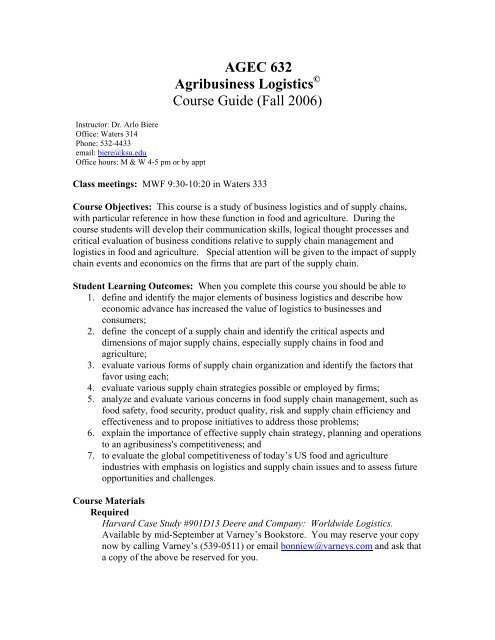
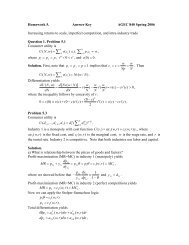
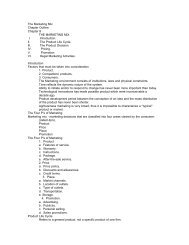
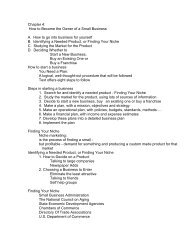
![[U] User's Guide](https://img.yumpu.com/43415728/1/178x260/u-users-guide.jpg?quality=85)
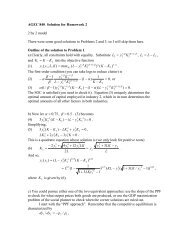
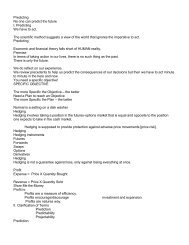
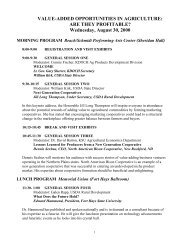
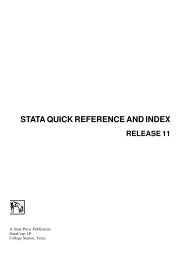
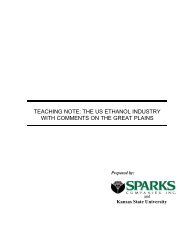
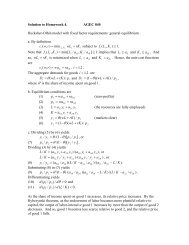

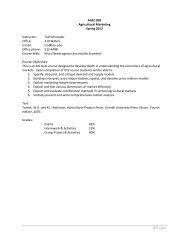
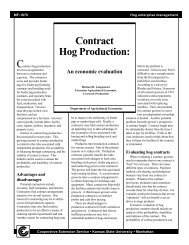
![[P] Programming](https://img.yumpu.com/13808921/1/177x260/p-programming.jpg?quality=85)